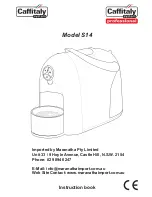
GB
5
OPERATING INSTRUCTIONS
Check that the shut-off valve of the water supply is
open, then plug in the machine and swich on the elec-
trical supply; the unit is now ready for automatic oper-
ation.
B) Check that water reaches the pan, that float stops
water inlet before overflow and that there are no water
leaks.
The normal water level inside the pan must not exceed
5 - 10 mm. of its upper part.
The water level can be regulated rotating the
microswitch in the slit of the ralative support, after hav-
ing removed the fixing screws “1” (see sketch).
This operation must be done after having disconnect-
ed the electricity supply.
Check that there is no abnormal vibrations due to loose
bolts and screws.
Observe safety practice, disconnect machine from
electricity supply before rectifying water leaks or tight-
ening screws and bolts.
E) Check an ice production cycle ensuring that the cubes
are conveyed into the storage bin.
F) Check the thermostat by putting a cube in contact with
the thermostat bulb inside the storage bin; it must stop
in 1 Minute and it will automatically resume (in a time a
little bit higher) after having removed it.
ATTENTION
In the event the icemaker is installed with altitude higher
than 500 m. from sea level, it is required a different ther-
mostat calibration, as due to barometric pressure
decrease, it is less sensitive and therefore the icemaker
continues to operate even if the storage bin is full.
Access to the thermostat is gained by removing the top of
the wiring case; tighten clockwise the regulating scew
(see sketch). As it is not possible to quantify the turns
according to the altitude being them different for any ther-
mostat, we suggest regulation by checking if the ice cube
in contact with the thermostat bulb stop the ice-maker not
later than 1 minute.
ICE-FORMING CYCLE
The ice cubes form around the fingers of the evaporator,
inside of a pan filled with water which is continuosly
moved by revolving paddies.
The water level is kept constant by a float connected to a
microswitch that controls a water inlet electrovalve.
Dimensions of cubes can be regulated by operating on the
microswitch inclination that controls the water level inside
the pan.
When the ice cubes have reached the required dimen-
sions they get in contact with the revolving paddles that
swings the relative paddle motor which operates a
microswitch that by means of a relay it causes simultane-
ously:
– Delivery of hot gas to the evaporator by the opening of
an electrovalve, with the consequent fall of cubes from
the evaporator.
– The tilting of the water pan controlled by a lever of the
harvest motor.
The formed cubes fall on a slanting grid inside the pan and
are conveyed in to the storage bin underneath.
The remaining water, collected in a pan placed on one
side of the bin, is then conveyed to the drain.
OPERATION
Summary of Contents for N25S
Page 2: ......
Page 16: ...GB 14 WIRING DIAGRAMS N25S AIR...
Page 17: ...GB 15 N25L N35S AIR...
Page 18: ...GB 16 N25S N25L N35S WATER...
Page 19: ...GB 17 N45S N45L N55S N55L N70S N90S N90L AIR...
Page 20: ...GB 18 N45S N45L N55S N55L AIR...
Page 21: ...GB 19 N50 B I AIR...
Page 22: ...GB 20 N50 B I WATER...
Page 23: ...GB 21 N70S N90S N90L WATER...








































